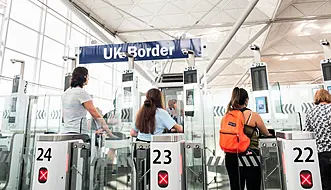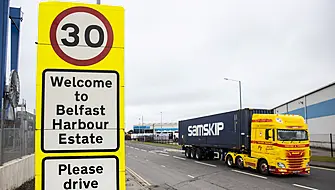Shelves in shops in the Republic will continue to empty post-Brexit because of the need to complete hours of customs paperwork, the Dáil has heard.
Independent TD Verona Murphy said there has been “utter disruption” in the supply chain since the end of the transition period, with truck drivers being stuck in ports for up to five days.
The former head of the Irish Road Haulage Association warned further jobs will be lost in the coming weeks and the consumer was set to pay the price in their shopping basket if the situation continues.
Around 30 per cent of goods moving from Britain to Dublin are being held back over issues around documentation, with some requiring further checks, Irish officials have said.
Trade volumes continue to be low in comparison with trade levels in previous years.
The consumer will pay a hefty price in their shopping basket if this is to continue
Ms Murphy told the Dáil: “Utter disruption has ensued since January 1st at ports, in businesses, and in the supply chain.”
“Food is being destroyed, businesses are failing, jobs are and will be lost,” she added.
“The consumer will pay a hefty price in their shopping basket if this is to continue, particularly those on low incomes.”
Food rotting
She said last year customs dealt with two million declarations and now they expect to deal with 20 million declarations.
“That’s 54,794, a day,” she added. “And if you add to that the ENS (Entry Summary Declaration) and the PBN (Pre-Boarding Notification) declarations that figure trebles to 164,382 computer entries daily.
“There are only 500 customs and excise staff. It’s currently taking four hours to do one declaration. And that’s why the boats to the UK are empty. That’s why the shipping routes to Fishguard are cancelled. And that’s why our shelves are emptying.”
Ms Murphy claimed the Revenue’s system has failed twice, adding: “That has seen foodstuffs going rotten in trailers, it has kept drivers away from their families sitting in ports for up to five days.”
She described the Department of Agriculture’s sanitary and phytosanitary checks as another “utter mess” requiring 24-hour notice.
Many UK companies were not as prepared as they could have been to the realities of Brexit
Taoiseach Micheal Martin said Brexit essentially meant that seamless trade between the European Union and Britain is “a thing of the past”.
“The UK has left the single market and customs union and that creates additional burdens. There’s also some evidence emerging that many UK companies were not as prepared as they could have been to the realities of Brexit and the various additional checks and controls,” he said.
He said Irish agencies were working “flat out” to ensure checks and controls were carried out as efficiently as possible, with over 1,500 additional staff working on customs.
The Taoiseach said hundreds of containers were going through customs every day and the numbers were gradually increasing.
Shopping basket
In response, Ms Murphy said the only reality people will face with Brexit is a 50 per cent increase in the cost of their shopping basket.
She added more boats were needed and antigen testing was also required at the ports.
Thousands of trucks have passed through Dublin Port in the last two weeks under new trade rules following the end of the Brexit transition period.

On Tuesday, Tom Talbot, head of the Revenue’s customs operations for Dublin Port, said the difference in experience at ports for those who prepared for Brexit, compared with those who did not, is “quite stark”.
He added that they have not reached capacity, but that volumes have been rising steadily to around 600 movements a day.
About 70 per cent of freight movements received immediate clearance from customs, with the rest being labelled as orange or red, which require further checks on documentation from hauliers.







